As a seasoned songwriter, I’ve faced my fair share of creative hurdles. Writer’s block can strike at any moment, turning a once-fertile mind into a barren wasteland. It’s a daunting challenge that every creative mind grapples with, and overcoming it can feel like an uphill battle.
But let’s not despair! There are ways to conquer this beast and get those creative juices flowing again. In this article, I’ll share some of the most effective strategies I’ve discovered in my years of songwriting. From simple mindset shifts to practical exercises, these techniques can help you navigate through the murky waters of creative slumps.
Remember, every great songwriter has faced and overcome these challenges. It’s part of the process, a rite of passage if you will. So let’s dive in and tackle these songwriting challenges head-on.
Contents
Understanding Writer’s Block and Creative Slumps
Ever wonder why your brain just decides to hit the brakes when you’re in the middle of working on a song? It’s not just you, it happens to all of us. Let me share my insight on why I believe this happens.
Writer’s block and creative slumps are almost as old as songwriting itself. During these troubling periods, it becomes a challenge to bring fresh ideas to the table. No matter how much effort you put in, inspiration just seems to be looking the other way.
Why does it happen? Let’s dig a little deeper into that question. Various factors contribute to blocking your creative wellspring. These include stress, self-doubt, anxiety, and even a poor work-life balance. It’s important to acknowledge that while these can be triggers, everyone’s experience is unique. What may cause a slump for me might not necessarily be an issue for you.
With all that said, it’s crucial to remember that overcoming these hurdles is as much a part of the songwriting process as the actual act of writing. It might feel like a never-ending cycle of frustration, but don’t worry, there are strategies to overcome it. My years of songwriting have taught me some effective techniques, which I’m excited to share with you in the sections to come.
This isn’t just about winning a battle but learning how to navigate these periods. It’s about learning the art of songwriting. We shouldn’t see writer’s block and creative slumps as dead ends but rather opportunities for personal growth and self-discovery. So, let’s embrace the challenge and soldier on! Remember, no two songwriters’ journeys are identical. Your unique perspective is your greatest strength.
The Mindset Shift: Embracing the Creative Process
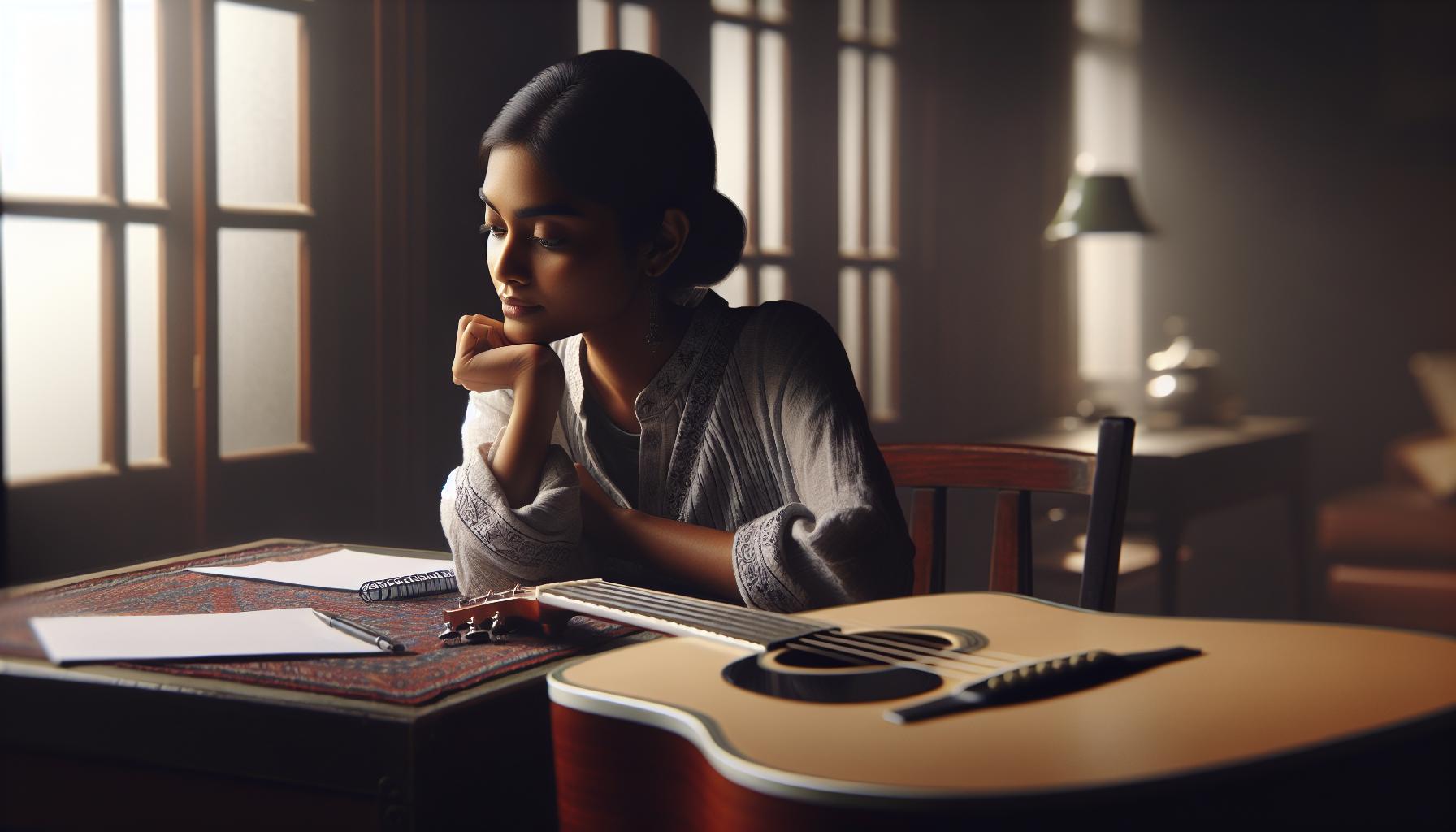
Let’s delve into an aspect that’s crucial for any artist or songwriter: mindset. Yes, I’m talking about the way you perceive your process. It’s about understanding that writer’s block or creative slumps are not roadblocks. They’re merely hurdles in your amazing journey of creation – something you need not fear.
I find it despairing when artists berate themselves during these challenging phases. My mantra is simple: creativity is not a faucet that you can turn on and off. It flows like a river – sometimes sluggish, sometimes in a rush. Facing hurdles, stumbling on stones, making unexpected bends – that’s all part of it. Embrace this fluidity as your norm.
This doesn’t mean you sit back and wait for the creative winds to blow your way. You can, and should, still work on nurturing your creativity. But remember, your creative struggle isn’t a negative phase. It’s an opportunity.
How so? Well, these ‘down periods’ can give you valuable insights into your creative process. They can help you explore new perspectives, confront your fears and limitations, and even discover unexplored parts of your artistic identity.
So, the next time you hit that so-called block or slump, remember: you’re not stuck. You’re evolving. You’re on a crucial juncture that can lead to great self-discovery and personal growth. It’s a space for introspection, recalibration, and rejuvenation of your creative energies. I recommend using this phase as a catalyst to expand your understanding of your creativity and push your boundaries. Take your struggles and turn them into springboards. That’s what the creative process is all about. It’s not always comfortable, but that’s where quality and originality come from.
In the end, songwriting, like every art form, is a journey. It’s a series of emotional highs and lows. So, embrace the ride and remember to be kind to yourself, even during the dips. Because it’s in these dips that you find your unique voice and make your most profound connections.
Breaking Through Blockages: Techniques to Try
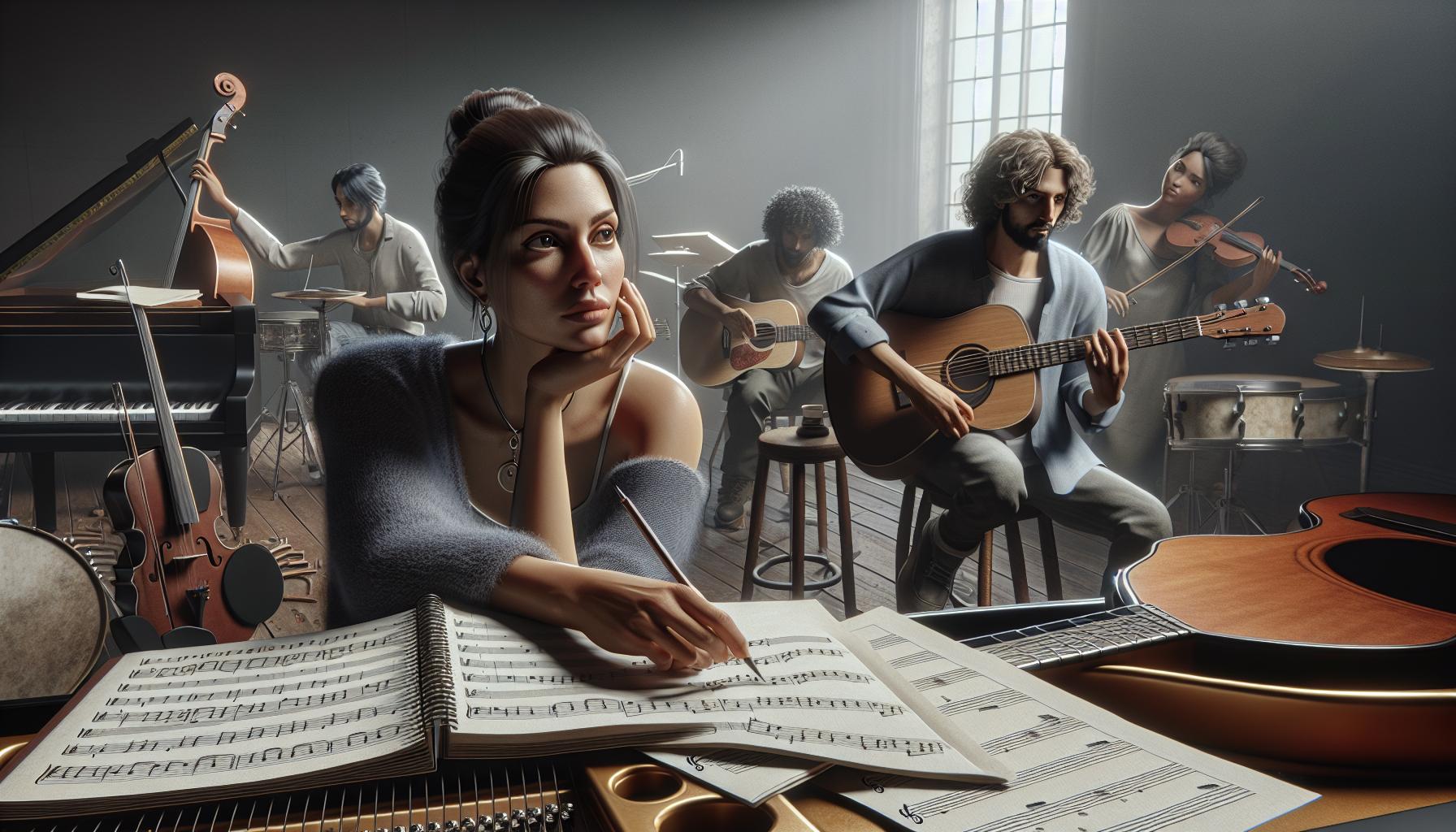
Getting stuck is a common experience in the songwriting process, but it doesn’t have to halt your creativity. Through certain techniques and strategies, you can easily navigate your way out of a creative slump or writer’s block.
Step Away and Take a Break
It’s often a good strategy to step back. Pushing too hard can lead to burnout and frustration. Go for a walk, meditate, or engage in a different activity. Your subconscious will continue the creative process behind the scenes.
Draw from Inspiration
Sometimes the best way to overcome a creative block is to seek inspiration elsewhere. Listen to your favorite songs, explore different genres, and let other artists’ work inspire you. Remember, it’s not about copying or comparing, but rather about sparking your creative flame.
Just Start Writing
Even if what you’re writing doesn’t feel perfect, just get it out. Let go of your inner critic and allow yourself to write freely. You might be surprised by what you can come up with when you stop pressuring yourself to write the “right” thing.
| Technique | Action |
|---|---|
| Step Away | Take a break and do something different |
| Draw from Inspiration | Listen to other music, explore different genres |
| Just Start Writing | Let go of the inner critic, write freely |
However, don’t forget that everyone’s creative process is unique. These techniques help many songwriters, but it’s necessary to find out the approach that works for you.
1. Freewriting and Stream of Consciousness
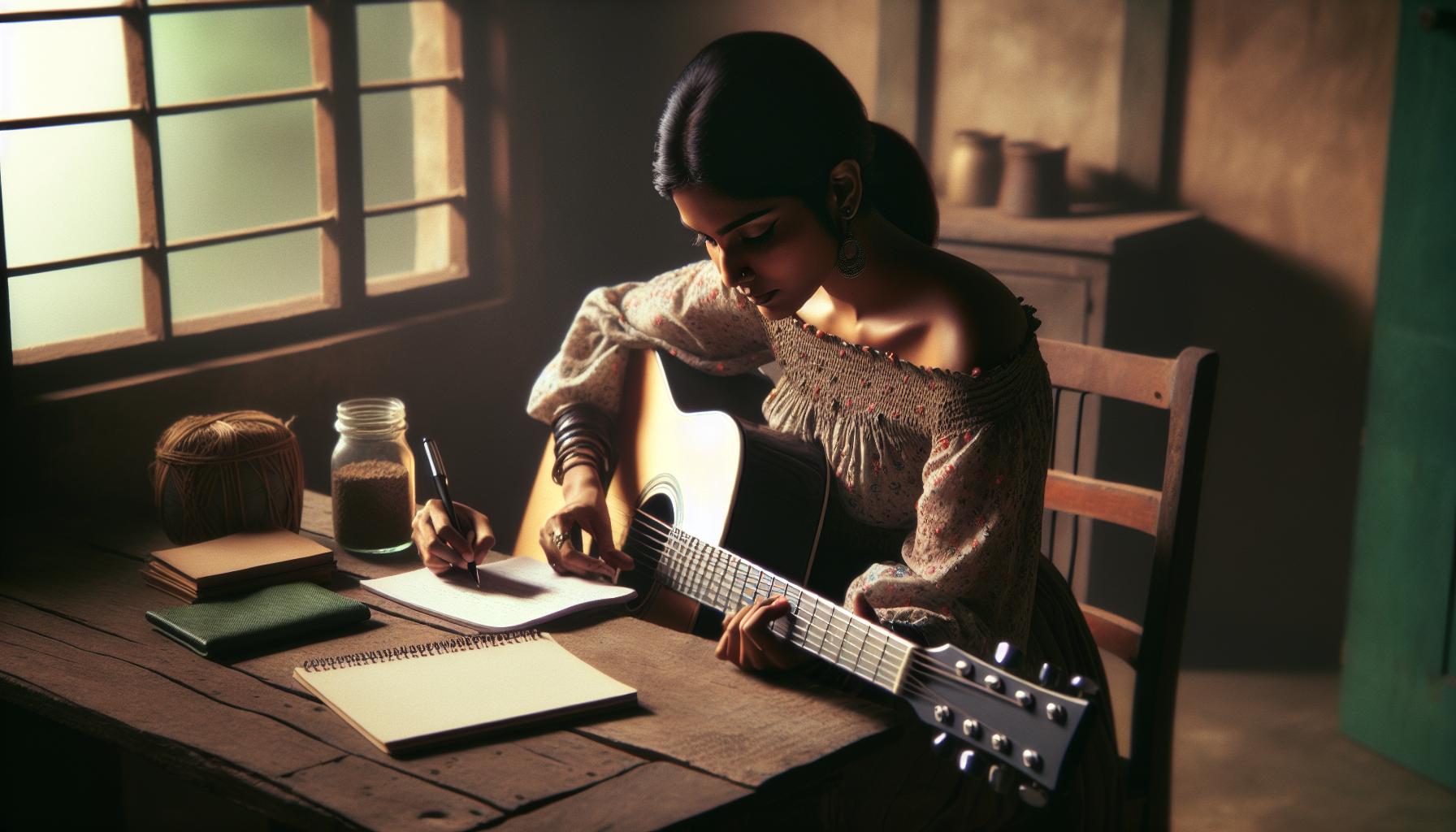
Stepping into the world of free writing can open doors you might never have thought possible. This technique is a secret powerhouse that can help you work around the mental stumbling blocks.
The principle of freewriting is to jot down whatever comes into your mind without worrying about grammar, punctuations, or any writing rules. There’s no pressure of sticking to any topic or being logical. It’s all about spontaneity. Just let your thoughts flow freely onto the paper or screen.
The idea is not to censor or judge anything that you write. Investigators of creativity found that many novel ideas and expressive words emerge during freewriting sessions. You’re likely to find gems of inspiration lurking in these unfiltered thoughts.
On the other hand, stream of consciousness is a notch higher than freewriting. It’s more of an ongoing narrative of the thoughts passing through the writer’s mind. Great songwriters of all time like Bob Dylan, Paul McCartney have used this technique effectively to craft some unforgettable songs.
My experience with this approach has been incredibly transformative. I sit down with my guitar (you could use any instrument you’re comfortable with), and I start playing some random melody. As I do that, I note down every single word, phrase, or sentence that comes to mind.
At first, it may seem like gibberish, and that’s okay! Once you learn how to tap into your stream of consciousness, you’ll be surprised how those random words and phrases connect coherently to create something unique.
Freewriting and stream of consciousness can unleash your creative spirit in extraordinary ways. Practice these techniques, and you’ll realize that writer’s block and creative slumps are just temporary obstacles, always remember that.
2. Collaborating with Other Songwriters

Ever found yourself stuck in a rut, playing the same chord over and over again? When you’re in a slump it’s easy to become trapped in your own patterns and habits. Introducing the power of collaboration.
Working with other songwriters can be an excellent way to break free from the cage of familiarity. It’s a way to push past your comfort zone and inject fresh energy into your creative process. I can’t emphasize enough how effective collaboration has been in invigorating my own experiences with writer’s block.
Diverse songwriting styles fuse to generate unique ideas and approaches. By involving others in your work, you get the chance to see the same chords, melodies, or lyrics through a different lens, stirring up creativity and opening up new paths to explore.
In my experience, collaborating not only sparked my imagination, but also taught me new techniques and approaches to songwriting. Whether it was a different philosophy about the writing process or a novel way to construct a melody, my collaborations offered endless opportunities to learn and grow as an artist.
Now let’s not forget, songwriting is a craft that thrives on community. Exchanging ideas, providing and receiving feedback, and simply sharing in the joy of making music are all part of the songwriter’s journey. They’re experiences that enhance your craft, build relationships, and inspire creativity.
Everyone has their own unique approach and style which gives you an exciting soloist aspect in songwriting. However, the dynamic nature of collaboration often brings forth an element of unpredictability, one that can lead to wonderful and unexpected creations.
As we’ve discovered, writer’s block and creative slumps aren’t insurmountable obstacles. Freewriting and stream of consciousness are powerful techniques to unleash your creativity. But remember, collaboration can be just as effective. Don’t underestimate the benefits of collaborating with other songwriters: broaden your horizons, shake up your routines, and challenge your creativity.
3. Exploring Different Genres and Styles
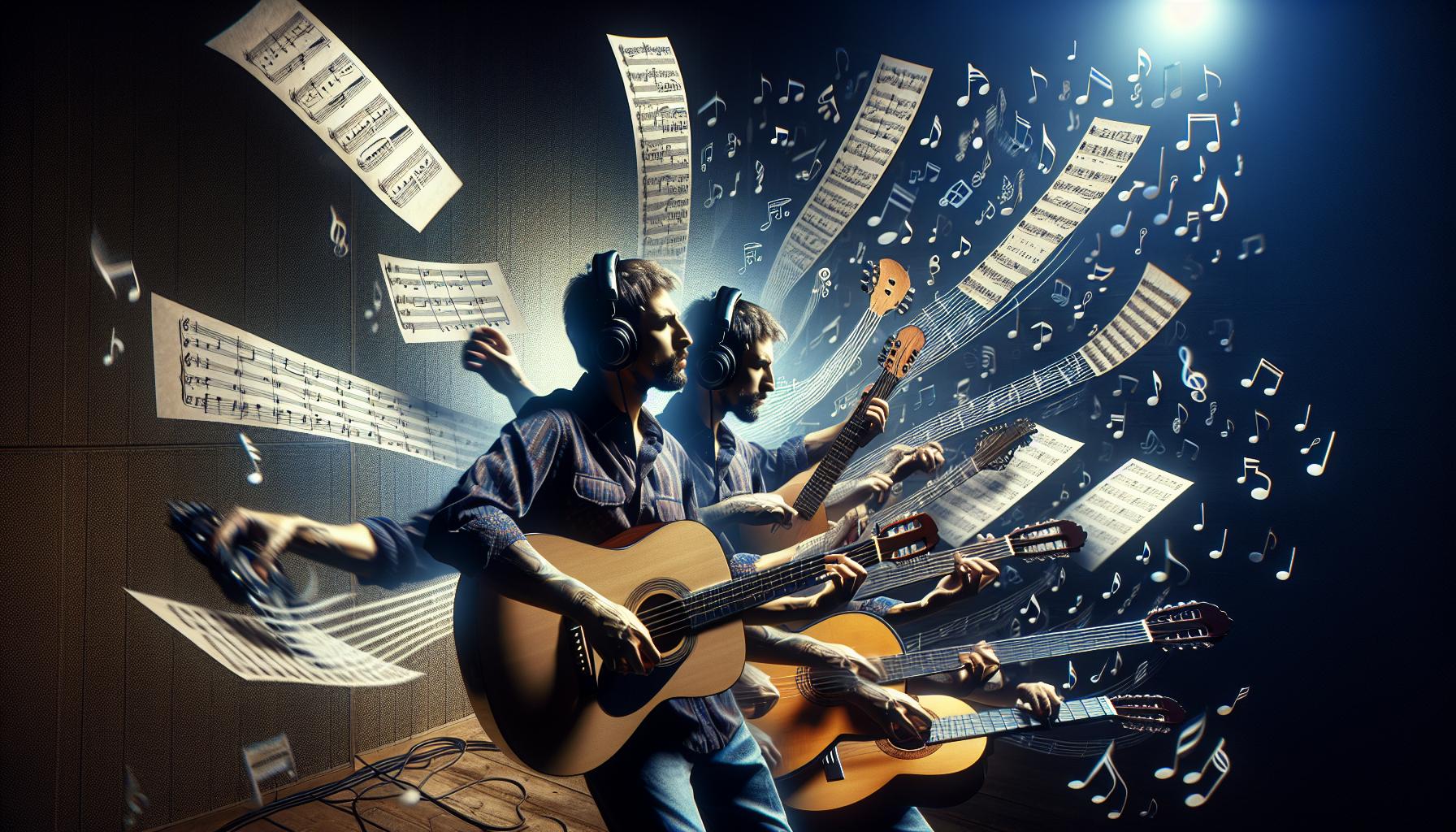
One methodology that’s highly effective in defeating writer’s block is daring to step out of your comfort zone and exploring different genres and styles of music. It’s easy to feel stuck when you’re always plowing the same field. Venturing into new territory can spark creativity and give fresh perspectives on songwriting.
Let’s consider a couple of advantages tied to delving into diverse musical styles.
Gain New Perspectives
When I experiment with different genres, I’m suddenly working within new parameters. This requires me to approach songwriting from new angles. It’s not just about finding different sounds or rhythms, but also about understanding a new set of rules and breaking my routine.
Consider the contrast between writing a rock anthem and a country ballad. Each has unique meters, chord progressions, and lyrical style. Adapting to these changes often inspires new melodies, lyrics, and arrangements that might never have come to light otherwise.
Unearth Unfamiliar Techniques
Diving into diverse genres often leads to the discovery of new songwriting techniques. For example, reggae music typically utilizes syncopation, slowing down the tempo, and heavily accenting the second and fourth beats. Implementing these techniques in your own compositions, irrespective of genre, can provide an innovative and unique touch.
To get started, I often study popular songs from the genre I’m investigating. These two points illustrate why stepping out of your comfort zone can be a game-changer for songwriting:
- It forces me to break away from routine and habitual thinking, offering new perspectives.
- It exposes me to different songwriting techniques, expanding my toolbox and versatility as a songwriter.
In the next section, we’ll chat about how changing up your physical environment can breathe new life into your music.
4. Setting Creative Constraints

After exploring collaboration techniques and diving into the benefits of experimenting with different genres, let’s discuss another powerful tool in overcoming songwriter’s block: setting creative constraints.
At first glance, it might seem counterintuitive to restrict oneself in a field that thrives on limitless possibilities. However, sometimes narrowing the focus can lead to mining unique gems. Remember, Constraints fuel creativity. By providing a framework to work within, constraints eliminate the overwhelm of ‘infinite possibility’ and can guide me towards finding unique, unconventional solutions to my creative slumps.
In songwriting, constraints can take many forms. It can involve setting a time limit to write a song, restricting oneself to a certain chord progression, using a pre-determined set of words, or writing in a specific key.
Take the constraint of writing a song in a limited period. By setting a timer, I present myself with a unique challenge. This simple restriction can spur on creativity, pushing me to make quick decisions, trust my intuition, and write more instinctively.
Chord progression constraints can also stir up the creative juices. By restricting the chord choices, I force myself out of comfort zones and usual patterns, prompting me to think about melody and harmony in new ways.
Utilizing pre-determined words or writing in a specific key can help with dealing with writer’s block too. These boundaries focus the creative process and can result in some truly innovative lyrics and melodies.
Consider this: In 2012, The London-based band, The xx, released their album ‘Coexist.’ They set themselves the constraint of simplicity – they deliberately chose to work with minimal equipment. The result? An album that stands out for its nuanced subtlety and unique sound.
Remember – when tackling songwriting challenges, constraints aren’t restrictions, they’re creative catalysts.
5. Practicing Mindfulness and Meditation
Taking a step back, let’s now focus on a strategy that’s a bit unconventional, yet, incredibly powerful – practicing mindfulness and meditation. These two practices can be incredibly helpful for songwriters who are struggling with writer’s block, and they’re not as complex as you might think.
Essentially, mindfulness is the practice of becoming fully aware of the present moment. When I’m engulfed in songwriter’s block, I find that my mind is often overrun with thoughts about my inability to create. Practicing mindfulness helps me to acknowledge these thoughts, and then let them go, bringing my focus back to the present process of creating music.
Now on the other hand, meditation is a deeper practice that involves calming your mind and body to help you become more in tune with yourself and your creativity. Even a simple 10-minute meditation routine each day can go a long way in easing stress and increasing creativity. Remember that stress is often a trigger for writer’s block, so finding ways to manage stress is fundamental.
One might wonder, “But how can these practices tangibly benefit my songwriting?” A study conducted by Leiden University showed that individuals who practiced open-monitoring meditation, a meditation focused on the observation of thoughts and feelings, were able to generate a higher number of new ideas than a control group who did not meditate. Here’s a brief overview of the results.
| Group | Number of New Ideas Generated |
|---|---|
| Meditation Group | 20% higher |
| Control Group | Standard |
It’s important to remember, of course, that mastering mindfulness and meditation takes some time. It’s not about achieving perfection, but about train your mind to focus and see things from a fresh perspective. Just as songwriting can be seen as a kind of meditation, mindfulness and meditation can power your songwriting, giving you the clarity to bypass your block and start creating anew.
Sparking Inspiration: Finding Sources of Creativity
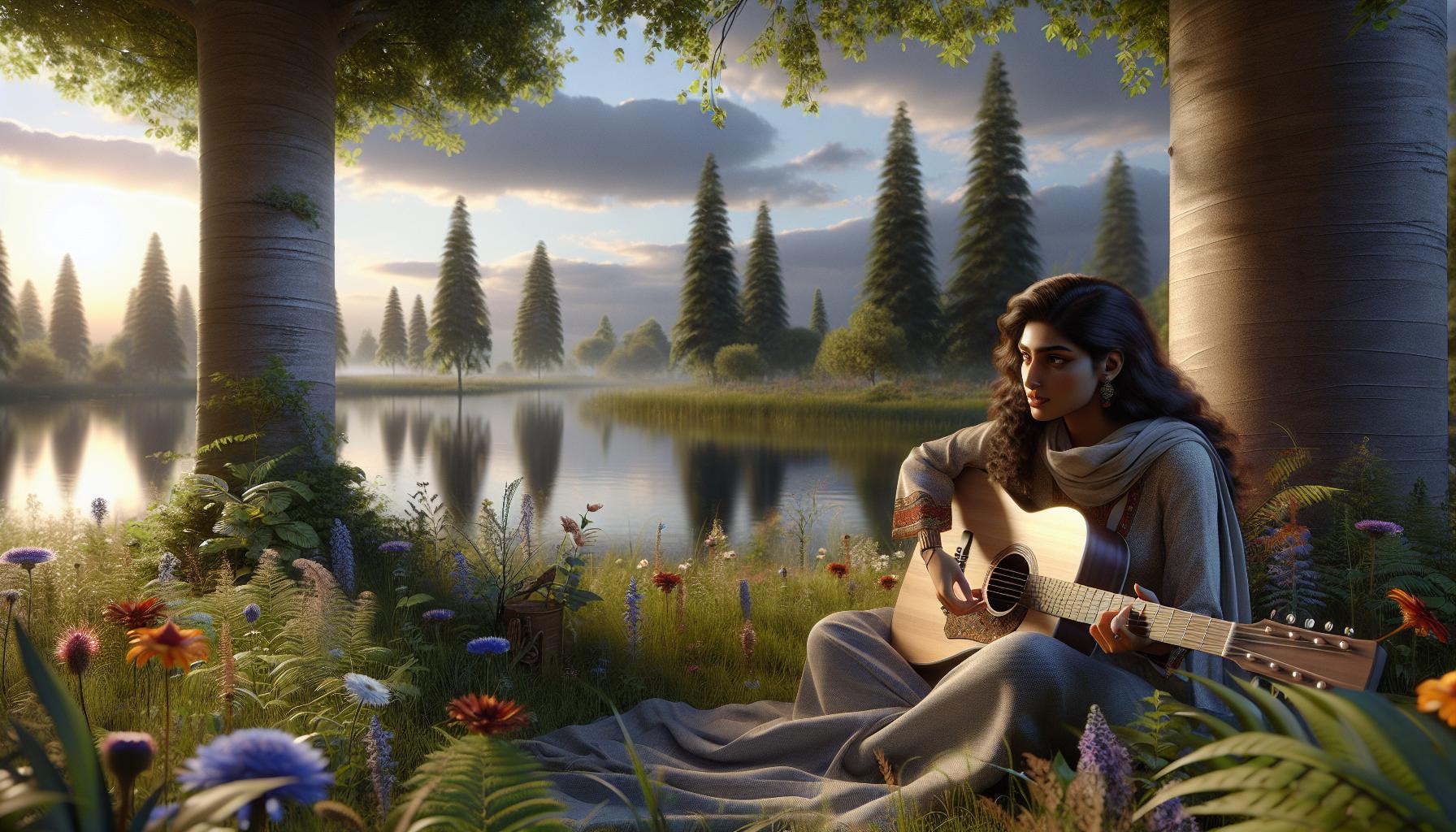
When it comes to overcoming songwriter’s block, it’s essential to tap into new sources of creativity. Creative stimuli are all around us. There’s no right or wrong place to find them, it’s a matter of where you direct your attention.
I’ll start with the power of immersing yourself in nature. Spending time outdoors, away from the distractions of technology, can boost creativity and provide fresh perspectives. From the intricate patterns of foliage to the hum of insects, the natural world is teeming with inspiration. You might be surprised at what a brief walk in the park, or a weekend trek through the wilderness, can provoke in your songwriter’s mind.
Then there’s the urban landscape. Cities, with their cultural dynamism and architectural diversity, offer countless prompts for the imagination. Try perambulating your city at different times of day. Write about the sounds you hear, the people you see, the emotions you feel. Mine your urban experience for lyric and melody ideas.
One method I’ve used to great effect is ambient noise experimentation. This might sound weird, but hear me out. From café chatter to rumbling traffic, ambient sounds can trigger creative thoughts and ideas. I often just sit and listen – letting the sounds of the world flow in, stir my imagination, and influence my compositions.
Don’t discount the impact of other art forms on our creative processes either. Movies, visual art, literature – these are potent catalysts for ideation. A stirring film, an evocative painting, or a deeply moving novel can spark unique lyrical concepts and musical motifs.
Most importantly, don’t forget to play with your instrument. Guitars, keyboards, drums – whatever your instrument of choice – are not just tools to jot down notes or to lay down beats. They are your companions in the creative journey. So, become friends with them. Experimentation and play can lead to happy accidents and exciting new musical directions.
Remember, inspiration is not something that simply ‘comes’ to you. It’s a muscle that you need to flex, a well that you need to draw from. The more you’re open to different experiences, the more likely you are to unlock new creative territories. Embrace the unexpected and turn the mundane into the extraordinary. But never stop learning, exploring, and growing as a songwriter.
1. Listening to Diverse Music

As an experienced songwriter, I’ve noticed that we often tend to get stuck in the same genre or style of music. It’s easy to get caught up in a cycle of producing similar sounding tracks. Although it’s great to have a signature style, it can also limit our creativity. Listen to diverse music – an effective method that aids in breaking free from the grip of such limitations.
You’d be amazed by how much your creativity can be sparked by exploring various types of music. The simple act of stepping out of your musical comfort zone can ignite new avenues in your songwriting process. Changing your musical playlist can act as a catalyst for the creative seasoning your songwriting lacks.
Don’t limit yourself to a particular genre or sound, spread your wings and delve into the realm of unknown tunes. From jazz to hip hop, classical to pop, folk to electronic, there is a treasure chest of musical genres waiting for you to explore. Don’t just listen! Engage your senses and realize the underlying structures, nuances, and themes.
Here’s a rundown on genres that you can explore:
- Jazz: A genre rich in complex harmonies and melodic improvisation.
- Hip Hop: Known for its robust rhythmic structures and poetic lyrical content.
- Classical: Offers complex musical forms and a wide range of emotional content.
- Pop: Captivating for its catchy melodies and repetitive structures.
- Folk: Full of narrative storytelling and traditional acoustic instruments.
Embracing diverse music not only broadens your musical palette but also equips you with a wider range of musical knowledge. Keep delving into new musical worlds, let your songwriter’s block work to your benefit. Remember, every genre has a different tale to tell and a different experience to offer in your songwriting journey. The more you’ll listen, the richer your songs will get. Hence, keep exploring and don’t let your creativity stagnate. Keep experimenting with sounds outside your accustomed genre, it’s a surefire way to create distinct compositions.
2. Engaging with Other Art Forms
As we look deeper into the realm of creativity and songwriting, it’s impossible to ignore the power of other art forms. They serve as reservoirs of unique ideas and concepts. Engaging with other art forms can be more than a hobby – it’s an effective strategy to refuel your creative engine.
For example, let’s take visual arts, such as painting, sculpture or photography. They provide detailed visual narratives, color palettes, and structures that can influence your songwriting. It helps me look at my music from a different perspective, often leading to fresh lyrics and innovative melodies.
Next on the list is literature. Books, poems, plays – they’re filled with intriguing characters, gripping stories, and rich languages. These elements can effortlessly seep into your songwriting, expanding your capacity to tell stories through music. I make it a point to read regularly and always keep a notebook handy to jot down inspiring phrases or ideas.
Delving into philosophical texts might sound a bit daunting, yet it could be a gold mine for song inspiration. They promote deep thinking and can stimulate robust emotional responses, laying the groundwork for compelling songs.
Lastly, don’t forget cinema and theater. The intense emotions, the dramatic arcs, the intricate dialogue – they stimulate my imagination like nothing else. Allow them to fuel your creativity and see how your songs start encapsulating all these elements.
Always be open to new ideas, no matter where they come from. Let me share a simple yet effective approach I use to explore other art forms:
- Go to a local art museum or a gallery.
- Read a book outside your regular genre.
- Attend a play or a local film festival.
- Delve into a philosophical book.
Understandably, each of these require time. But then again, it’s a worthwhile investment to keep your creativity in top form.
The next section of the article will cover how to channel these inspirations effectively. Stay tuned for more insights and tricks.
3. Observing and Reflecting on Life Experiences

Life experiences, they’re powerful tools in overcoming songwriter’s block. Every moment, every interaction, every emotion is a potential muse. It’s the primary means for songwriters to form a personal and emotional connection with listeners.
You may wonder, “How do I translate my experiences into music?” It starts with observation and reflection. Chronicling these experiences – be it happiness, anger, love, influx of feelings or even the mundane view of a rainy day – can springboard the leap from experiencing to creating.
A great habit I found beneficial is to maintain a journal. Writing down thoughts and emotions as they occur organically – can spark a new song or a verse. It molds and shapes our observations into well-articulated lyrics.
In reflecting on experiences, it’s helpful to ask poignant questions. What did this particular event mean to me? How did I react? I found that these in-depth analysis dive deeper into the emotional layer of the experiences. They push the boundaries of creativity, instigating a richer and more complex lyrical content.
While absorbing stimuli, remember – inspiration often strikes when least expected. I’ve found melodies forming while people-watching at a café, or a lyric bubbling up from an overheard conversation at the park.
You might say, “It’s all well and good, but I’m lacking unique experiences.” Hey, I’ve been there. Sometimes, it’s not about seeking new experiences, rather finding new insights in familiar ones. Reflect on past experiences, revisit them with a fresh lens, you might surprise yourself with the number of songs waiting to find their voice.
In the end, it’s not just about observing and reflecting on experiences, but to incorporate them into our songwriting process. Finding the song in the everyday, in the ordinary, in the grand and in the minute is a thrilling journey. This approach of imbuing experiences throughout lyrics widens the scope of creativeness, compelling listeners to resonate with the artistry of songs.
So next, we turn our attention to another valuable resource to beat that songwriter’s block: learning new music techniques.
4. Seeking Feedback and Mentorship
Learning new music techniques and writing skills can push you past your creative rut, but sometimes it’s important to seek out feedback and mentorship. This is another potent approach to overcoming songwriter’s block.
You might ask, “Why is feedback important?” Well, feedback provides a fresh perspective on your work. It’s easy to get trapped in your own thought process, and a second set of eyes can help highlight areas you hadn’t noticed. Critiques can push you to reassess your work, increase your creativity, and ultimately lead to better songwriting.
To seek feedback, consider sharing your works-in-progress with trustworthy friends, fellow musicians, or online communities. Friendly peer reviews can give you a fresh perspective or offer a new technique you hadn’t considered. Don’t shy away from criticism; it’s the key to growth.
Having a mentor in your corner can also be invaluable in overcoming songwriter’s block. A mentor with more experience and understanding of the industry can provide tailored advice, share useful strategies, inspire you with their stories, and encourage you to keep going when you’re feeling stuck.
But how does one find a mentor? Lists of potential mentors might indeed contain:
- Experienced musicians you admire
- Music teachers or professors
- Industry professionals met at events, seminars, or online
Reach out to potential mentors, expressing your admiration for their work and your eagerness to learn from them. You’ll be surprised how many are willing to lend a hand to aspiring musicians. This openness, paired with a growth mindset, will project you forward through any creative obstacles you may face.
Surely, the importance of seeking feedback and mentorship in overcoming songwriter’s block can’t be overstated. It’s a constant learning process and every bit of advice, critique or encouragement you receive can open your mind to new possibilities, making your creative journey an enriching, continual ride.
Looking towards the future, we’ll explore more inspirational resources and methods in the subsequent sections, aiding you greatly in navigating the stormy seas of songwriter’s block.
Overcoming Perfectionism: Embracing Imperfection
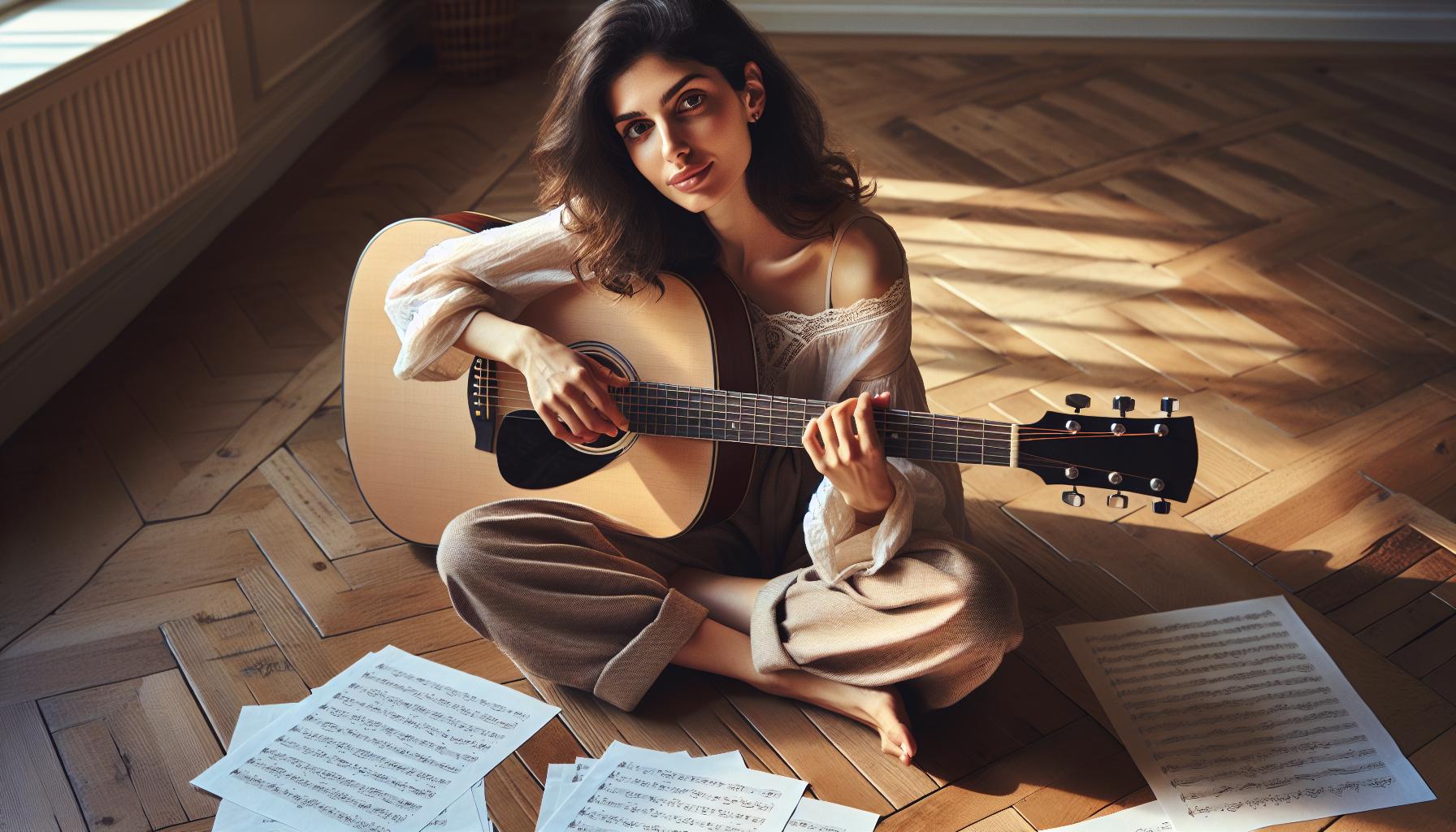
Perfectionism can be a serious roadblock in the creative journey. It’s common among songwriters to get stuck because we’re trying to create the “perfect” song. We pressurize ourselves to produce the best possible lyric or chord progression every time we set out to write. However, it’s vital to remember that the aim isn’t to dish out perfect songs every time but to grow and learn as a songwriter.
Perfectionism hinders creativity. In the pursuit of perfection, we often sideline the process of creation itself. Instead, let’s try embracing imperfection and vulnerability in our songwriting. It could act as a catalyst in our journey of overcoming songwriter’s block.
Here’s a strategy that’s proven effective. Involve risk-taking in your routine. It’s an opportunity to unleash unfiltered creativity and test boundaries, let loose, and experiment with different musical styles, lyric techniques or songwriting formats. The ultimate goal isn’t perfection. It’s about creating something authentic, raw, and uninhibited.
Embrace the Process
It’s crucial to put more emphasis on the process of songwriting, rather than the final product. The path to a great song might lie in a string of “not-so-great” songs. You learn more about your style, strengths, limitations, and preferences by actively engaging in the craft rather than focusing solely on the finished product. This process-centered approach is bound to make songwriting more enjoyable and less stressful.
Follow these approaches, and the wall of perfectionism just might crumble. It’s a journey, a learning experience, a way of overcoming hurdles that previously stopped our progress. Noticeably, it may also lead to the birth of songs you never thought you could write.
Conclusion
Overcoming songwriter’s block and creative slumps isn’t always easy, but it’s necessary to keep the creative juices flowing. Embrace the power of feedback and mentorship. They’re vital tools that can provide fresh perspectives and tailored advice, helping you to grow as a songwriter. Remember, it’s okay to share your works-in-progress and seek constructive criticism. It’s also crucial to overcome the paralyzing grip of perfectionism. Embrace your imperfections, take risks, and let vulnerability fuel your creativity. Finally, shift your focus from the final product to the process of songwriting itself. Enjoy the journey of creating music. It’s not just about the destination, but also the beautiful, challenging, and rewarding path to get there. In the end, it’s these experiences that shape us as artists and make songwriting truly fulfilling.
